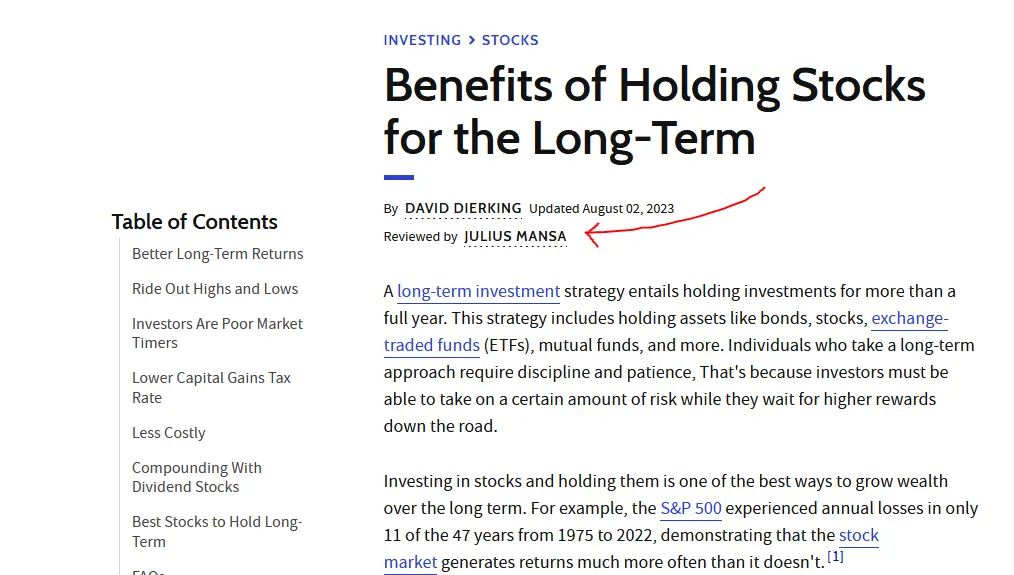Investopedia in a nutshell
Established in 1999, Investopedia has evolved into a leading financial website, offering a treasure trove of articles, tutorials, courses, and financial tools. It caters to investors, students, and finance professionals, seeking to enrich their financial knowledge.
Is the information on Investopedia reliable?
Yes, for the most part, Investopedia is a reliable source of information for general investing information.
The things it does well are basic definitions, concepts, formulas, and tutorials.
Whilst the information is good, it should not be relied on as the sole resource for anything particularly advanced. It should not be the basis for your investment strategy or be used for academic purposes.
Firstly, let’s explore what makes Investopedia at all reliable & credible.
Investopedia Financial Review Board

The financial review board is responsible for overseeing all the content on Investopedia.
In their own words:
“The board includes certified financial planners, certified public accountants, economists, entrepreneurs, financial analysts, investors, tax experts, and university professors.”
These are the people responsible for fact checking and editing content. You will often see one of their names at the top of an article, letting you know someone with a qualification has reviewed the content for accuracy.
Whether we can trust these individuals have indeed reviewed the article or are simply lending their name and credentials, is another matter (more on this below).
Editorial Standards
Investopedia say:
“We aim to ensure that all of the articles on our site are empowering, unbiased, accurate, and inclusive.”
The company say they follow:
- The Codes of Ethics of the Society for Advancing Business Editing and Writing (SABEW).
- The Society for Professional Journalists’ foundations of ethical journalism.
- The Federal Trade Commission (FTC) guidelines on disclosures where applicable.
There is clearly a great deal of effort going in to ensuring the team is ethical and unbiased (or at the very least, projecting that they do).
Furthermore, all staff are responsible for disclosing any conflicts of interest.
The content should be fairly neutral. But it may be skewed by affiliate commission interests (discussed further below).
Who owns Investopedia?
Investopedia is owned by Dotdash Meredith, a large publisher that also owns The Balance, a more beginner-friendly site targeted towards Millennials.
Dotdash Meredith give some facts about Investopedia:
- The average household net worth of the Investopedia reader is close to $1m.
- 88% of their readers actively manage their household finances.
- 76% of users take action after reading Investopedia.
That last point is crucial. If we are to believe that statistic, three quarters of Investopedia readers see them as reliable enough to take some sort of action after consuming their content.
This is also an important stat for financial reasons. Investopedia needs users to take action after consuming their content, as that is one of the primary ways they make money.
How Investopedia Makes Money / Fact checkers & Reviewers
How something is funded often leaves clues as to the reliability of the source. The promise of money can often cause information to become biased or unreliable.
Investopedia makes most of its money through advertising and affiliate marketing.
Most of the advertising is automatic and therefore has little impact on the content. The affiliate revenue, however, has the potential to skew Investopedia’s content.
You will know if a piece of content has affiliate links or a sponsored placement when you see the appearance of an ‘Advertiser Disclosure’ box:

eToro, in the example above, are paying Investopedia to be featured as a recommended broker. They either pay a flat fee for prime placement, or give Investopedia a cut of anyone who signs up as a result of the link on this page, or both.
Investopedia are honest in that, because they are receiving compensation from these investment brokers, they may appear more frequently and be recommended more often.
Would Investopedia recommend other providers if money was no consideration? Possibly. But that is the nature of creating a sustainable business.
The aforementioned editorial review protocol should theoretically reduce the amount of content promoted purely for financial reasons, against the interest of their readers.
That means the businesses Investopedia do partner with should be legitimate, highly rated providers even if they are not the crème de la crème.
SEO (search engine optimization) & expertise
You should also be aware that some of what Investopedia do (the editorial policy, their review board) is possibly lip-service to Google.
You may have noticed that Investopedia is the top search result on Google for many finance related queries.
Indeed, Investopedia attracts most of its traffic, and therefore makes most of its money, through people searching for answers on Google. In other words, from SEO (search engine optimization).
Google likes websites that demonstrate expertise, experience, authority, and trustworthiness (E-E-A-T) and Investopedia demonstrates that in abundance. That’s why Google likes them so much.
But Google is not a person. It uses ‘spiders’ (robots that search the web) to gather information and read the code of websites to determine whether a source is reliable and trustworthy.
To that end, Google’s algorithm can be manipulated somewhat, and Investopedia may be ‘playing the game’ in that sense.
This is not to suggest Investopedia is unreliable and maliciously gaming the system.
It is just to say that Google doesn’t necessarily put the best and most reliable information at the top of their search results page. Google cannot possibly know what the absolute best resource is for your investment query.
However, Google has seen enough reliable content from Investopedia and positive engagement from users that it feels Investopedia is a reliable source to promote on its search results pages.
Investopedia vs Wikipedia
Investopedia and Wikipedia are two different entities, despite the similar brand names.
They tend to be grouped together as they are both often top of the Google search results, but they have significant differences, apart from being two separate companies entirely.
- Wikipedia information is written by effectively random members of the public (bad) but is also peer-reviewed by fellow trusted Wikipedia contributors (good).
- On the other hand, Investopedia information is generally written by accredited financial professionals or at least reviewed by other accredited professionals (good) but is not peer reviewed by external parties who can assess its impartiality for example (less good).
Ultimately, Investopedia is not as unbiased as Wikipedia is (or should be) but the content is likely reviewed by more experienced industry professionals.
Can you reference (cite) Investopedia in academic papers?
Personally, I would advise not referencing Investopedia in anything academic.
Firstly, the brand name has connotations of ‘Wikipedia’ which, of course, you should never list as a reference.
While Investopedia is a valuable resource for general information and understanding financial concepts, it is not considered a scholarly or academic source.
In academic writing, it’s important to cite reputable, peer-reviewed sources and scholarly literature to support your arguments and provide evidence for your claims.
Investopedia is pretty good at citing their sources. So, if you find something you want to quote, simply find the original source within the Investopedia references, make sure Investopedia are quoting it correctly, and cite that instead.
Again, that’s not to say the information on Investopedia is seen as unreliable, but your paper will have more credibility if it comes from the original, and (even more) reputable sources.
Summary: Is Investopedia a reliable and trustworthy source?
We recommend using Investopedia as a source for brushing up on key investing concepts, but perhaps not too much more than that.
It can be a good source of news, but you may get more insightful and reliable information from the likes of the Wall Street Journal, Bloomberg and The Economist.
As a source of investment advice or strategy, it may push you down the wrong route. If you are looking to start investing, you might want to consult more widely known and respected books on the topic.
Of course, we also have our beginners guide to investing, which is 100% impartial and provides us with no monetary benefit. We simply believe the passive investing strategy (which the guide promotes) is by far the optimal way to invest for 99% of people.






